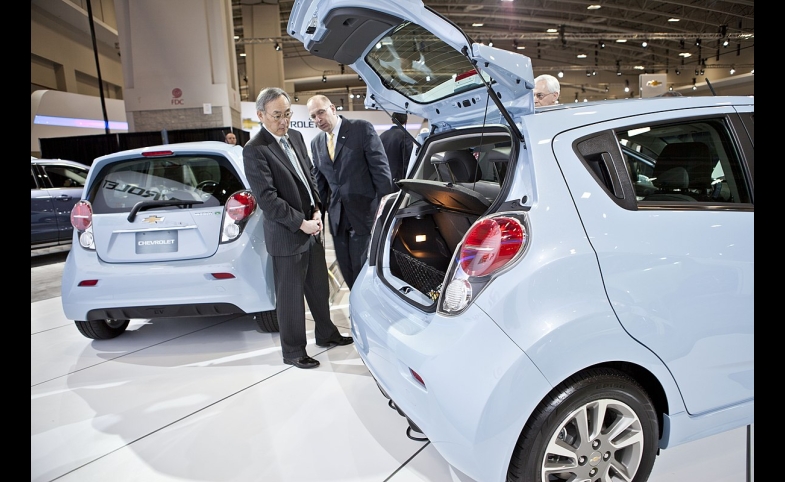Last month, I joined some 130 Buddhist leaders, teachers and scholars representing over 60 major Buddhist schools and ethnicities in Washington D.C. for the first White House U.S. Buddhist Leaders Conference. Of...
KEEP READINGThe CPD Blog is intended to stimulate dialog among scholars and practitioners from around the world in the public diplomacy sphere. The opinions represented here are the authors' own and do not necessarily reflect CPD's views. For blogger guidelines, click here.

Can Innovation Diplomacy End the Climate Gamble?
Today’s climate crisis presents a grim state of affairs. Decisive stakeholders in governments, academia, and the private sectors, seem to struggle rather than progress on one of humankind’s most pressing missions. The growing urgency of addressing these issues, however, underscores the need for perhaps unconventional yet game-changing approaches, where multilateral diplomacy and technology leaders align to catalyze innovation for the global good.
To achieve carbon neutrality and wealth, socio-ecological health must lie at the heart of the endeavor. To be clear, we are facing the threat, not nature, which has the ability to adapt. Our challenge lies in averting the likely scenario of a planet uninhabitable to humans. The globe is warming, putting serious strain on food security, healthcare, and other elements of civilization. We must adapt reactively, by implementing measures that enhance our resilience to harsher conditions, and actively, by reducing further damage to nature. The encouraging message here is, with ever-increasing scientific advancements, innovating and implementing novel technologies could bring solutions on time if we can be more effective.
As per the International Energy Agency’s Net-Zero Emissions Scenario (NZE), we are losing the game by missing the 1.5 °C target. Stagnating or even rebounding CO2 emissions for the transportation sector following the pandemic are real. While technological innovations to mitigate these dynamics are yet to be developed at scale, intellectual property quarrels, patent mining, and resource battles create friction beyond healthy rivalry for best solutions. Sadly, this seems to also set the tone in the political domain. We simply are not on track.
Moving Toward an Electrified Future
While the discourse on still-to-be-solved technological and policy challenges in the innovation arena is ongoing, the future of transport will likely look electric. Electric vehicle (EV) sales show exponential growth, jumping one order of magnitude every five years. In 2023, starting with an annual revenue of half a trillion USD, nation states and companies are engaging in a race for e-mobility dominance, gradually reshaping the global automotive market spanning 2.5 trillion USD. Likewise, the battery industry provides new entrepreneurial grounds, growing from 100 billion to a trillion USD this decade.
By fostering safe dialogue and prioritizing common over unilateral interests, innovation diplomacy can drive meaningful action where progress is urgently needed.
The sheer size and societal magnitude of this transformation bring great responsibilities to all actors. While politicians set the rules and fence the field, for instance, through the US Inflation Reduction Act or the EU Net-Zero Industry Act, corporates and their R&D departments have to operate within these boundaries. The EU’s battery passport is a motivating example of how regulatory initiatives can support innovation. Market participants shall receive a more even playing field, but also incentives to foster sustainable innovation.
But besides such yet-to-be-proven initiatives, is the overall playing field set up right? Can players perform at their best? Today, the answer must be no. Looking behind the day-to-day in the EV and battery sector, it is evident that while progress is made, potentials are lost along the way. Even in traditional automotive nations, initiating support to enable innovation is debilitating. Political and bureaucratic inertia hinder building a performative innovation chain.
Playing the Innovation Diplomacy Card
This is where innovation diplomacy must take place. Similar pointers have appeared before, but little has followed. Innovation diplomacy must be equipped with definitions and scope to be effectively leveraged by state and non-state actors. To accelerate innovation, innovation diplomacy can build bridges to enable transparent knowledge-exchange on neutral grounds, open up positive dialogue between otherwise competing stakeholders, and build trust beyond unilateral interests. This approach must combine the perspectives of research, industry, and states, in a systematic, forward-facing exchange.
Various platforms—from exchange programs, to conferencing, to social media—can facilitate innovation diplomacy. Multilateral events such as the coming Autonomous e-Mobility Forum in Qatar can spur knowledge-exchange and partnership across borders and competitive lines, held together by the common interest in much-needed innovation to tackle global warming. Leveraging such initiatives and resources can maximize impact, streamline efforts and grow international know-how.
The urgency to accelerate innovation, meanwhile, is calling new players onto the field. To include new perspectives and approaches, logical candidates could be states that have not been classic research-based economies or technology manufacturers.
Such players can be seen in the Middle East, where the dynamic Gulf states continue to make notable strides to advance research and innovation. This momentum is rooted, on the one hand, in energy wealth; on the other, in comparable national visions mapping these nations’ transition away from carbon to knowledge-based economies. These frameworks emphasize contributions to topics of global significance, especially highlighting environmental challenges, and a commitment to the UN Sustainable Development Goals.
Innovation diplomacy offers a pragmatic frame for addressing the very complex but pressing challenges facing our global community. By fostering safe dialogue and prioritizing common over unilateral interests, innovation diplomacy can drive meaningful action where progress is urgently needed.
Visit CPD's Online Library
Explore CPD's vast online database featuring the latest books, articles, speeches and information on international organizations dedicated to public diplomacy.
POPULAR ARTICLES
-
January 29
-
January 20
-
January 28
-
January 2
-
February 6
Join the Conversation
Interested in contributing to the CPD Blog? We welcome your posts. Read our guidelines and find out how you can submit blogs and photo essays >.














